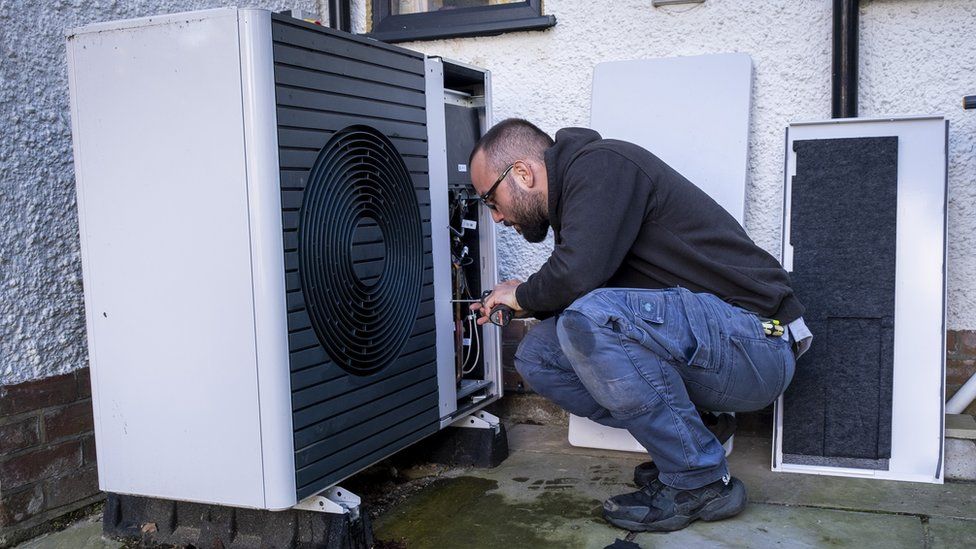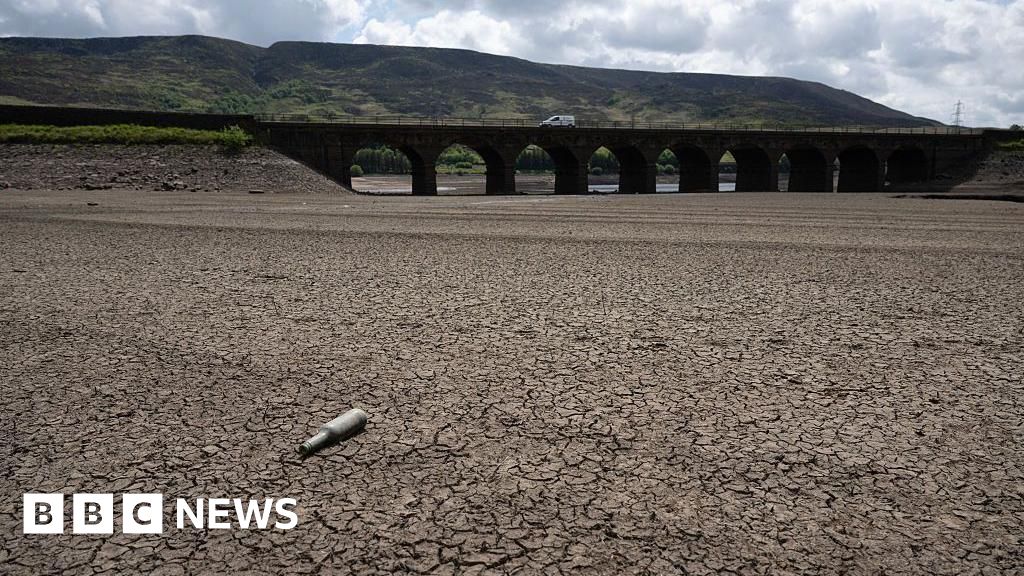ARTICLE AD BOX
 Image source, Andrew Aitchison/Getty Images
Image source, Andrew Aitchison/Getty Images
The government has a target to install 600,000 heat pumps a year
By Esme Stallard
Climate and science reporter, BBC News
A flagship government plan to make household heating more planet-friendly has had a weak start in its first year.
The Boiler Upgrade Scheme gives out £5,000 grants to help households switch to heat pumps, which burn much less of the carbon which warms our atmosphere.
It is meant to issue 30,000 grants annually in England and Wales but only managed half that in its first year.
Experts blamed a lack of installers and the cost of properly insulating homes so that they are ready for a heat pump.
Heat pumps are a key part of the government's promise to reach net zero in the UK by 2050, meaning no more greenhouse gas would be added to the atmosphere. Home heating currently accounts for 14% of the UK's carbon emissions.
The data published on Thursday on grants issued since the scheme started in May 2022, comes a day after the UK's climate watchdog said the government was "significantly off track". The scheme lasts until 2028.
The UK's Climate Change Committee (UKCCC) highlighted high heat pump cost, the low number of trained heat pump installers and the lack of energy efficiency measures like insulation, which are needed for heat pumps to be effective, as the main reasons for low installation.
The £70 million left over due to grants not being issued last year cannot be used for grants in future years and will now be returned to the Treasury.
A spokesperson for the Department of Energy Security and Net Zero, which is responsible for the scheme, said: "Industry has reported an increased level of enquiries and we are confident that deployment will increase as the year progresses."
In February, the Lords Committee raised concerns that the scheme was underperforming. The government responded by saying it would launch a marketing campaign to promote the scheme.
It said that in the first 14 days of running the campaign there was a 62% increase in clicks to the gov.uk page compared to the previous 14 days. But the government's own figures show that the number of vouchers given out has dropped since March. The government intends to undertake wider promotion later this year, it said.
To meet the UK's climate change targets, the government wants to install 600,000 low-carbon heat pumps annually within five years - currently rates are around one-ninth of this.
Even with the Boiler Upgrade Scheme grant heat pumps can cost £10,000 to install compared to a few thousand for a new boiler.
Major energy suppliers Octopus Energy and EDF are now offering heat pumps for less than £3,000 for some properties.
But Dr Shaun Fitzgerald, director of the Centre for Climate Repair at University of Cambridge told the BBC that the cost can rise if additional insulation is needed to improve the efficiency.
The UK old housing stock is among the worst insulated in Europe. The government has announced a new scheme which it hopes will deliver 376,000 insulation measures - from loft to solid wall insulation - between 2023 and 2026.
Although costs for heat pumps continue to come down - the cost per unit fell 6.7% in 2022 - inflation and labour cost rises mean the total cost of installation only fell 1.9% in 2022 having risen by 19.2% the previous year.
Adam Chapman, CEO of Heat Geek, one of the UK's leading trainers in the heating industry, said that at the moment gas engineers earn far more to fit boilers than heat pumps so there is no incentive to retrain.
"The demand is there for the consumer but not the installer. We need a stronger policy that we are going to phase out boilers," he said.
Whilst prices remained high, said Mike Pitts, Deputy Director at the UK's national innovation agency, the UK government could also consider raising the grant offered in line with Scottish government's scheme. It offers a £7,500 grant and up to an additional £7,500 as a loan to cover the full cost of a heat pump.
Image source, Dave Baldwin
Image caption,Dave Baldwin installed his heat pump in 2022 but saw his EPC rating worsen
Bean Beanland, director for growth and external affairs at the Heat Pump Federation is more optimistic about the scheme. He said it had a "rough start" with the online portal failing to launch till November, but since had picked up.
"The government could transform the performance if they address the future pricing of electricity vs fossil fuels," he said.
Heat pumps use electricity, and as the UK moves to cheaper renewables the cost of running the heating systems could come down, but the electricity price is set by the highest cost fuel which is currently gas.
A house which is more efficient to run can increase the sale or rental value, and currently efficiency of a home is determined by an EPC rating. To encourage home improvements the government has proposed that all new tenancies properties need an EPC of C by 2025.
But the crude methodology for calculating EPCs currently penalises homeowners for installing heat pumps. It looks at potential costs of heating a property assuming long-term high electricity costs vs gas, without considering efficiency of the system.
Dave Baldwin used the Boiler Upgrade Scheme to get a heat pump installed last year - he said he is happy with the technology but his EPC rating dropped by 13 points from a C to a D after it was fitted.
"My poor EPC rating is academic to me as I am seeing huge energy costs savings by having the heat pump, but in the future it may place me at a disadvantage, particularly if I want to rent out my property," he told the BBC.
The government is planning to consult on a new methodology for assessing and producing EPCs later this year.
Related Internet Links
The BBC is not responsible for the content of external sites.

 1 year ago
46
1 year ago
46








 English (US) ·
English (US) ·